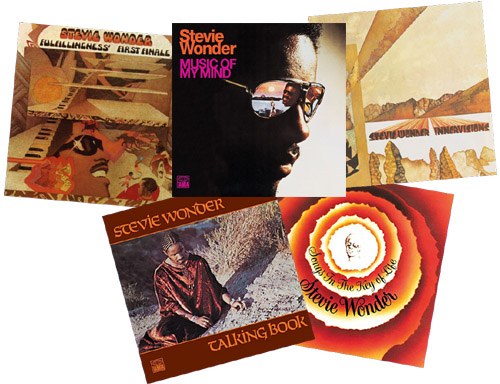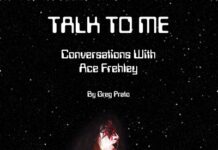By Ira Kantor
It all started with a singing elephant.
Like most toddlers, my son Freddie will watch something ad nauseum if he likes it. Over the past couple of weeks, his film of choice while we’ve been in familial quarantine is the animated feature “Sing.” At the film’s end, an animated female elephant named Meena brings a makeshift stage literally down belting out Stevie Wonder’s 1973 song “Don’t You Worry ‘Bout a Thing.”
Hearing this version about 316 times in the span of a few days, I started thinking that now was the perfect time to properly dip into Stevie Wonder’s five-album “classic period” spanning five years during the 1970s. I needed to see if all the universal acclaim heaped on these albums was warranted.
Not that I wasn’t a Wonder fan previously. He’s one of those artists where everybody knows at least one of his songs. In fact, when I was probably around Freddie’s age, I remember “Part-Time Lover” blaring from radio stations, along with Springsteen’s “Dancing In The Dark” and Starship’s “We Built This City.” Take the classic period out of the equation and there are still a number of 1980s Wonder songs I enjoy — the danceable “Do I Do,” the saccharine “Overjoyed,” and the subdued yet peppy “Go Home” included.
But I never really listened to Wonder from an albums perspective. So I took the plunge and after several listens to his greatest five albums — Music Of My Mind (1972), Talking Book (1972), Innervisions (1973), Fulfillingness’ First Finale (1974), and Songs In The Key Of Life (1976) — I came away with these truths:
- There’s a reason Wonder won the Album of the Year Grammy three times for three simultaneous albums. They are actually that good.
- Wonder’s virtuosity not only extends to his ability to sing and play multiple instruments, but the fact he can craft lyrical works of art. If he sings a love song, it hits you straight in the heart. If he writes a political song, you hear the glorious vitriol within the groove.
- Few artists can sustain excellence over multiple albums. In Wonder’s case, he starts at the top with Music Of My Mind and steadily climbs and aspires higher until he reaches the apex with the unsurpassable behemoth that is Songs In The Key Of Life.
- By the time of Music Of My Mind’s 1972 release, Wonder had been a recording artist for 10 years with 13 additional studio albums under his belt. Talk about creative stamina!
I’ve since decided to pester anyone who will listen to me about the need to listen to these five albums. Yet it’s not enough to simply highlight the highlights given the high probability most of you will know the hits from each. “Superstition” is played on classic rock radio constantly. “Boogie On Reggae Woman” is a fun listen but overpowered by Stevie’s harmonica playing. if you don’t know the lyrics to “Sir Duke,” “I Wish,” or “Isn’t She Lovely,” chances are high you can at least hum the core melodies from each.
No, as testament to Wonder’s well-deserved genius the more underrated tracks from each album need
to be showcased. These 10 tracks weren’t designed to be hits per se but they do a superb job of showcasing the extent of Wonder’s respective creativity and its limitless possibilities:
“Love Having You Around” – From Music Of My Mind
Kicking his classic period off with wonderful fuzzy chords, Wonder keeps things direct describing the joys of flying a kite and riding a camel. Yet the innovation is already bubbling as Wonder backs himself with himself through a talk box before hitting the soulful hook of “And I sure do love having you around!” At more than seven minutes long, Wonder already makes it clear the music of his mind isn’t meant to be contained in any way.
“Superwoman (Where Were You When I Needed You)” – From Music Of My Mind
Easily the best song on the album, Wonder starts simply, sweetly, and direct before changing the entire shape and scope of his song three minutes in. There’s suddenly unexpected emotion to his music (oh that synthesizer!) and his lyrics (“Where were you when I needed you like right now?”). If painting a scene for us here, Wonder would be Monet. A track like this takes the air out of a more jubilant Wonder hit like “For Once In My Life” and turns out to be a far better effort.
“I Believe (When I Fall In Love)” – From Talking Book
Art Garfunkel made this the opening track of his most successful solo album Breakaway. His version is nearly a note-for-note copy of this underrated Wonder tune, which closes out Talking Book. Clearly, Garfunkel knew perfection when he heard it.
“Living For The City” – From Innervisions
This is Wonder in full social consciousness mode. The synthesizer build up is just as intense as the power in his voice. You can just visualize him pounding the chords out. Combine Marvin Gaye’s “What’s Going On” with Nina Simone’s “Mississippi Goddam” and you have this track. Don’t get sucked up in the groove entirely though as Wonder’s sense of race and being is summed up in one penultimate lyric: “To find a job is like a haystack needle ‘cause where he lives they don’t use colored people.” You find your eyes growing larger hearing his words and, at the same time, your foot tapping because the beat is one of his best.
“All In Love Is Fair” – From Innervisions
This is Wonder’s ode to the classical masters while taking his own personal brand of gospel into unchartered territory. This should easily rank among his greatest ballads. While the melody is unchanging, Wonder’s emotive vibrato is really all the instrumentation needed here.
“You Haven’t Done Nothin’” – From Fulfillingness’ First Finale
Arguably one of Wonder’s lesser-known Number One hits, this song stands out for two reasons: it sounds like the musical continuation of “Superstition,” and Wonder puts his political songwriting front and center post Innervisions’ “He’s Misstra Know-It-All.” If you want to see the song’s true impact, watch Wonder bring the house down with it at the Grammys and see the entire audience clapping along and all but shouting “doo da wop.” It brought tears to my eyes, not out of sadness but more out of frustration, especially considering we’re actually living the scenario of a leader providing misinformation to a frightened collective population. Simply put, it’s Wonder’s “Ohio.”
“Creepin’” – From Fulfillingness’ First Finale
One of Wonder’s more sensuous and erotic tracks; enhanced further by the coquettish vocals of the late, great Minnie Riperton. This is about as far from “Lovin’ You” as you can get. Even Wonder’s harmonica sounds horny.
“Black Man” – From Songs In The Key Of Life
One of the greatest history lessons you’ll ever hear about race in your life, all backed by a groove that would make Parliament-Funkadelic salivate with delight.
“As” – From Songs In The Key Of Life
There isn’t a thing to dislike about this song. What starts out as a seemingly basic Stevie Wonder love tune transforms when that glorious amalgam of background singers begins rattling off the infinite combinations surrounding true togetherness. When Stevie hits the beautiful elongated note of “Always” shortly before the three-minute mark, you’re hooked. Herbie Hancock’s Fender Rhodes noodling keeps the energy going. And then there’s the moment Wonder roughens his voice at the 3:50 mark. He’s confessing; he’s preaching; he’s having the time of his life. From there the final three minutes is the best kind of musical religious experience you can undertake. When my wife and I danced to this as our first song at our wedding, we didn’t have any structured moves. Instead we let the song take us over. While it may not be Wonder’s intention to take us to church here, a song like this has me considering converting.
“Another Star” – From Songs In The Key Of Life
For anyone thinking Wonder can’t outdo himself per “As,” they must listen to this track. Incorporating the jazzy guitar work of George Benson (perfect timing per his Breezin’ period!), Wonder leaps from church into a full-blown dance club (try not getting sucked into those background “La la la’s”). Though the entire musical journey lasts more than eight minutes, it is glorious to hear Wonder’s jubilation of this track. Closing the original vinyl release of the album, Wonder goes out with a full bang – one that will leave listeners dazed and amazed at the same time realizing what a journey this has been.



















